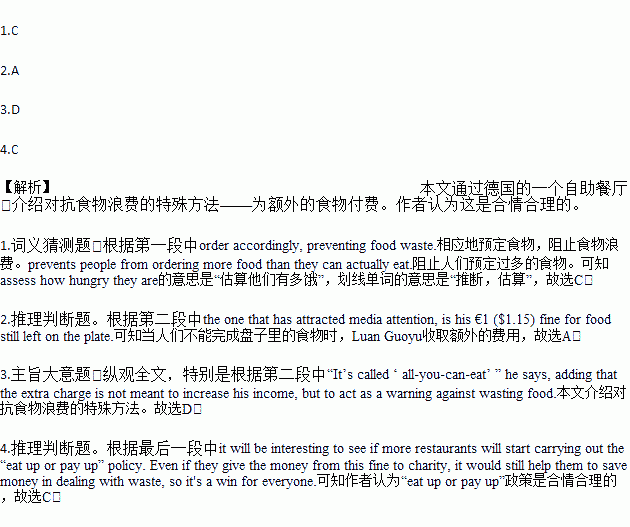题目内容
Yuoki, a restaurant in Germany, is not your everyday all-you-can-eat buffet (自助餐). For starters, there isn't an actual buffet to fill your plate. Instead, customers are seated at a table and provided with iPads which they can use to order up to five small dishes every ten minutes. They can eat as much as they want for 120 minutes, but having the food served at short intervals (间隔) allows diners to constantly assess how hungry they are and order accordingly, preventing food waste. Also, the owner, Luan Guoyu, believes, “our eyes are bigger than our stomach”, so not being able to see the cooked food at the buffet prevents people from ordering more food than they can actually eat.
But Luan Guoyu's most effective way of fighting food waste, and the one that has attracted media attention, is his ?1 ($1.15) fine for food still left on the plate. “It’s called ‘ all-you-can-eat’ ” he says, adding that the extra charge is not meant to increase his income, but to act as a warning against wasting food.
Luan Guoyu's system is unique in the state of Baden-Wurttemberg, but not in Germany. Okinii, a Japanese-style restaurant in Dusseldorf, has also been charging customer, the same ? 1 tax for unfinished food on their plates since 2013.
With so many people living on the edge of their nations, and food waste becoming a serious problem in developed countries, it will be interesting to see if more restaurants will start carrying out the “eat up or pay up” policy. Even if they give the money from this fine to charity, it would still help them to save money in dealing with waste, so it's a win for everyone.
1.What does the underlined word “assess” in Paragraph 1 probably mean?
A. Doubt. B. Realize.
C. Judge. D. Compare.
2.What will Luan Guoyu do when people can’t finish the food on their plates?
A. He will charge them extra money.
B. He will advise them to eat up the food.
C. He will ask them to take the food away.
D. He will warn them to order less food next time.
3.What is the text mainly about?
A. Various German restaurants.
B. The seriousness of food waste.
C. Secrets of managing a restaurant.
D. Special ways to fight food waste.
4.What does the author think of the “eat up or pay up” policy?
A. Unfair. B. Funny.
C. Reasonable. D. Doubtful.
 阅读快车系列答案
阅读快车系列答案
